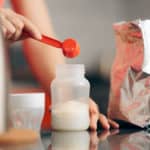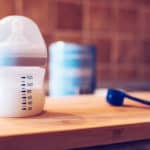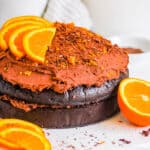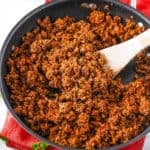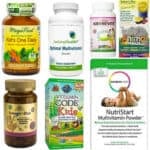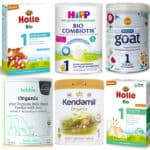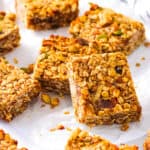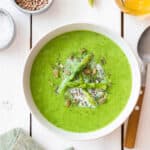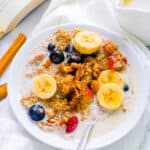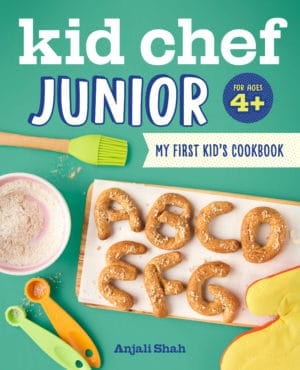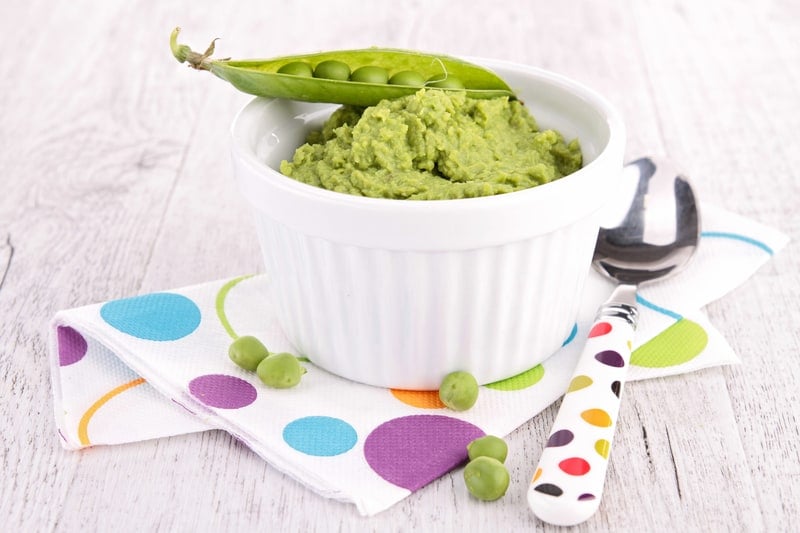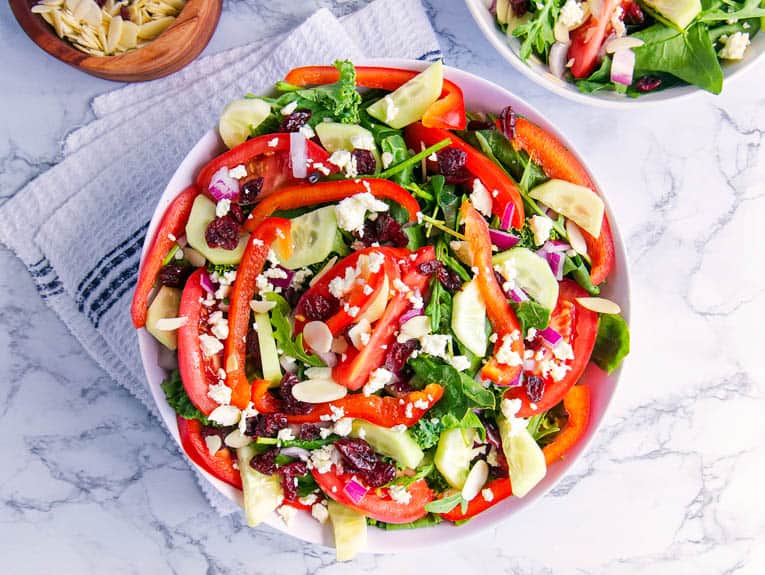Holle vs. HiPP Formula: Which Organic Formula Brand is Best?
This post may contain affiliate links. As an Amazon Associate, I earn from qualifying purchases. Please read my disclosure.If you’re a parent looking for a high-quality formula for your baby, you’ve likely come across two popular options: HiPP Organic vs. Holle Formula. In this parent-friendly guide, I will explore these two infant formula options, outlining their differences, the pros and cons of each, and what to consider when choosing between these two formulas for your baby.
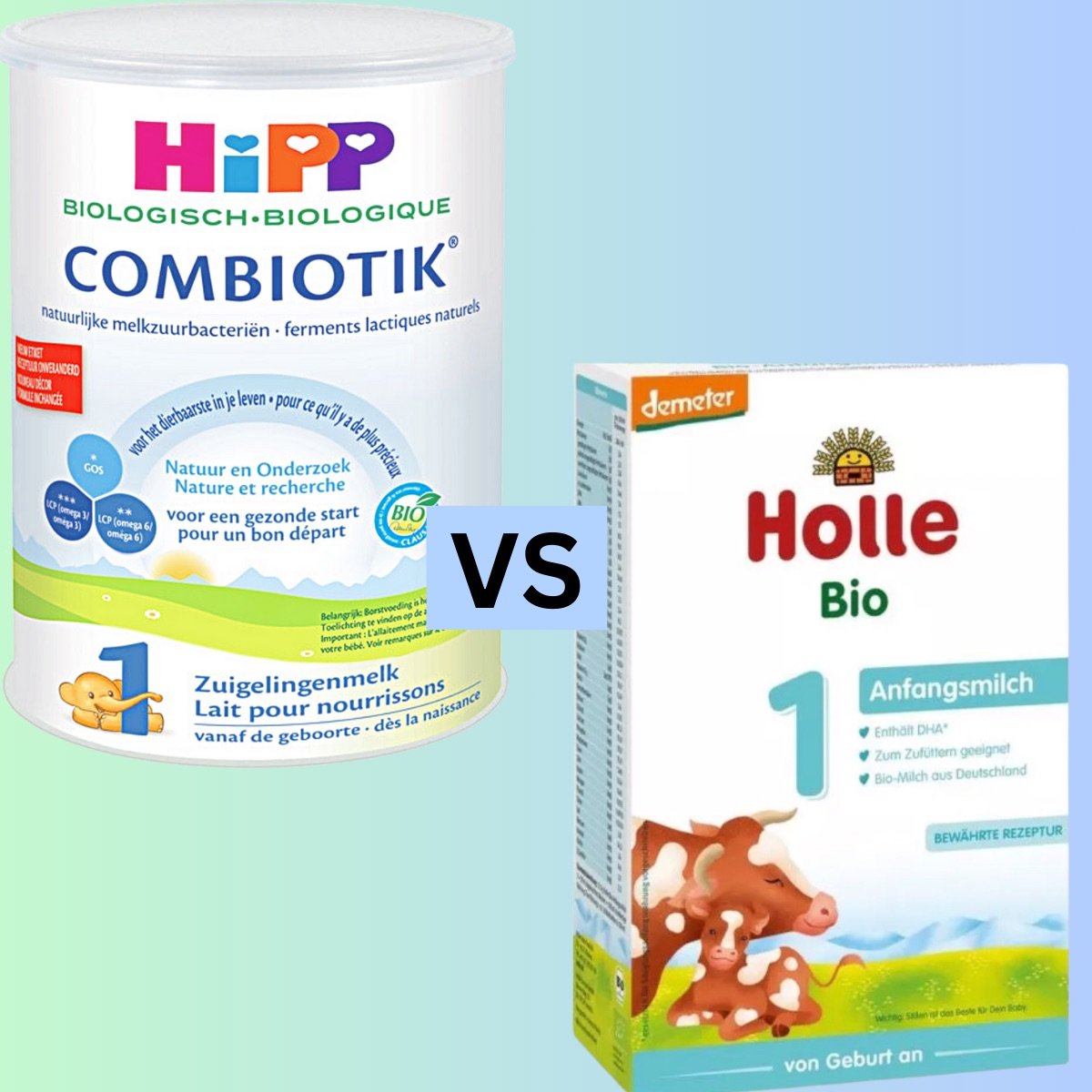
I get it! Finding the right baby formula can be overwhelming for new parents. But don’t worry, I’m here to help! We all want what’s best for our little ones, and finding an affordable formula with clean, toxin-free ingredients is a top priority.
I’m excited to share my insights on two of the most popular brands in the organic baby formula space: Holle Europe and HiPP Organic.
Choosing between the two can be confusing, but don’t worry, I’ve got you covered! I’ve created an article explaining the ingredients and benefits of these nourishing options. So, let’s dive in and find the perfect baby formula for your family!
Key Takeaway
HiPP and Holle are both great organic baby formula options. When deciding which one to pick, it’s important to keep in mind that the best choice for your baby is the one that will make them happy and comfortable.
That often means picking a formula that fits their dietary needs and your lifestyle, budget, and personal preferences. When weighing the options between Holle and HiPP, just remember to put your baby’s needs first! You really can’t go wrong with either one!
A Disclaimer & Methodology
As a board certified health coach and certified nutritionist, I support products and ingredients that are rooted in science and are evidence-based. Using my background in nutrition, along with extensive research (see below for details), consultations with experts, and my own personal experience giving my two kids formula, I have created this guide comparing Holle vs. HiPP Formula.
My recommendations are based on:
- Over 200 hours of extensive research
- Speaking with thousands of parents on what has worked for their children
- Reviewing both manufacturers’ claims and ingredients lists
- Speaking with doctors and pediatricians
- Reviewing countless articles and peer-reviewed studies
Though I may receive a commission (at no extra expense to you) if you purchase through some of the affiliate links provided, I only recommend products I’ve researched, evaluated, consulted experts on, and would feel comfortable giving to my own two children.
As always, I only share products that are the highest quality and that can help you and your family the most. By purchasing any of these products from the links below, you help keep this blog running, so thanks for your support!
Keep in mind that every baby & situation is different, so when it comes to choosing a baby formula, please consult with your pediatrician first before starting or switching to a new formula. My recommendations are not a substitute for professional medical advice, diagnosis, or treatment.
Two Reputable Brands That Stand The Test Of Time
HiPP and Holle are two European organic baby formula brands that have earned the trust and loyalty of many parents.
HiPP has been producing organic baby formula and baby food for over 60 years, and its formulas are known for their high-quality ingredients, such as grass-fed cow’s milk and sustainable agriculture practices. When my kids were infants, I gave them HiPP Dutch and they did great on it!
Holle has been operating for over 85 years and prides itself on using only the best organic ingredients, such as biodynamic milk and no added preservatives.
Both brands are solidly committed to sustainability and the environment, making them popular choices for parents who prioritize their baby’s health and the planet’s well-being.
Holle Baby Formula Overview

Holle Formula was founded in 1933! They’re from the Swiss town of Arlesheim and believe in a holistic approach to everything they do. Holle’s company priorities are: to care for people, nature, and future generations, in addition to prioritizing sustainable company management!
Today, Holle Formula is an international company with a presence in more than 50 countries and offers over 90 baby and infant products. But even with all that growth, it stays true to its Swiss origins and traditional values. It’s a family-owned company committed to making the world a better place for all children in all generations.
Holle Organic Standards
I appreciate that Holle offers a range of baby formula products made with cow and goat milk, and that all of their formulas are certified by Demeter Organic – the highest European organic certification. This certification guarantees their products are sourced from biodynamic farming methods prioritizing animal welfare, biodiversity, and soil health.
Holle Formula Options & Ingredients
Let’s look closer at Holle’s ingredient options and product range. Families can choose between Holle cow’s milk, Holle A2 cows’ milk, or Holle goat milk, which benefits little ones with sensitive digestive systems.
They also come in multiple stages: Holle provides formula for babies aged 0-6 months, aged 6-10 months, 10-12 months, and toddler formulas for babies 12+ months and older!
The best part about Holle’s formulas is that they are free of corn syrup, artificial sweeteners and GMOs, and contain essential nutrients such as vitamins A, D, and E, minerals, and essential fatty acids like DHA and ARA. Additionally, Holle’s formula products offer excellent value for money. They use only simple, EU-certified organic and GMO-free ingredients, resulting in a fantastic price-to-quality ratio.
Holle Organic Pros & Cons
| Pros | Cons |
|---|---|
| EU & Demeter certified organic ingredients | Contains palm oil (sustainably sourced) |
| No added sugar | Some stages contain maltodextrin |
| Free of preservatives | No prebiotics |
| Non-GMO ingredients | No probiotics |
| Contains essential vitamins and minerals for baby’s development including vitamins A, D, and E | |
| Gluten-free | |
| Soy-free | |
| Short ingredients list | |
| Contains DHA & ARA | |
| Relatively affordable ($25.99 each when purchasing a 12 pack) |
Holle Formula: Key Takeaways
- Family owned for 85 years
- EU & Demeter organic certified
- An affordable organic formula option
- Has cow, A2 cow, and goat milk options, with different stages for different ages
- Does not contain prebiotics or probiotics
- A finalist in the German Sustainability Awards 2023
HiPP Baby Formula Overview

HiPP Formula is another excellent European based company specializing in organic farming and infant nutrition. They’re also the largest processor of organic-biological raw materials worldwide!
The HiPP legacy began over a century ago with grandfather Joseph HiPP. He worked in a bakery and candle shop and wanted to help his wife find a way to feed their twins. In the late 1950s, HiPP introduced the first types of baby food in tins and eventually upgraded to the much handier and more hygienic jars in around 1960.
As the HiPP family began industrial production of baby food, they committed to cultivating fruit and vegetables on natural soils without chemicals. They even partnered with the founder of organic-biological farming, Dr. Hans Müller, to produce healthy and tasty baby food from organic raw materials. Together, they developed the concept of organic farming further, step by step, and eventually expanded to produce organic baby formula as well.
HiPP Organic Standards
HiPP is dedicated to using only organic ingredients in its products. To demonstrate this commitment, it proudly displays the EU Organic logo. But that’s just the beginning—HiPP goes the extra mile to guarantee its products are as pure as possible. The brand adheres to strict guidelines to eliminate pollutants such as air and soil that could contaminate its supply chain.
What sets HiPP apart is its unique quality tests that ensure no pesticide residues in its products. The brand is proud to use an internal seal that guarantees its products are made with only the purest natural ingredients.
HiPP offers many formulas made to meet the unique needs of babies. They comply with the regulations of the UK, Germany, and the Netherlands.
HiPP Formula Options & Ingredients
HiPP offers cow’s milk-based formulas, goat milk-based formulas, and specialty formulas there is something for every baby’s needs.
They also have multiple stages, just like Holle: for babies aged 0-6 months, 6-12 months, 12-24 months and they have an extra toddler stage for babies 24+ months old.
HiPP’s formulas have prebiotics; some also have probiotics from lactic acid culture, which are taken from natural breast milk. This means you can give your baby a formula that’s as close to breast milk as possible. Personally, when I used HiPP, I was happy to not have to supplement with prebiotics and probiotics since those were already included in the formula.
In addition to prebiotics and probiotics, the formulas use powdered organic milk, organic vegetable oils, vitamins, minerals, and omega-3 and omega-6 fatty acids (ARA, ALA, DHA).
HiPP Organic Pros & Cons
| Pros | Cons |
|---|---|
| EU certified organic ingredients | Contains palm oil (sustainably sourced) |
| No added sugar | Some stages contain starch or maltodextrin |
| Free of preservatives | Slightly more expensive than Holle |
| Non-GMO ingredients | |
| Contains essential vitamins and minerals for baby’s development | |
| Gluten-free | |
| Soy-free | |
| Contains DHA & ARA | |
| All variations of HiPP contain both prebiotics and probiotics |
HiPP Formula: Key Takeaways
- Legacy began over 100 years ago
- EU Organic Certification
- HiPP UK is UK’s #1 organic formula milk brand
- Formulas contain prebiotics, probiotics, DHA and ARA making them some of the most comprehensive formula options available
- Has cow, goat, and hypoallergenic options, including different stages for different ages
What’s The Difference Between HiPP vs. Holle?
While I consider both HiPP and Holle great choices, there are a few differences between these two formulas that you may want to consider when you’re deciding between them. My chart below provides a detailed comparison of the two formulas based on their ingredients, nutritional value, and other important factors to help you make an informed decision.
| HiPP *************************** | Holle **************************** | |
|---|---|---|
| Carbohydrates | Most HiPP Formulas: 100% lactose as the primary carbohydrate HiPP Comfort and HiPP Anti-Reflux: Lactose + Maltodextrin | Most Holle Formulas: Contain a combination of both lactose and maltodextrin as the carbohydrate source. Holle Cow PRE & Goat PRE: 100% lactose-based |
| Whey:Casein Ratio | 60:40 ratio, to mimic mature breast milk. HiPP Anti-Reflux contains 100% whey, HiPP HA and HiPP Comfort contain partially hydrolyzed whey proteins. | 60:40 ratio, to mimic mature breast milk. Note: Holle Goat has 20:80 whey casein ratio. |
| Protein | All HiPP formulas contain casein protein. HiPP Goat contains A2 casein protein, while HiPP Cow formulas contain A1+A2 casein protein. HiPP HA and HiPP Comfort formulas contain modified / hydrolyzed proteins. | All Holle formulas contain casein protein. Holle Goat contains A2 casein protein, while Holle Cow formulas contain A1+A2 casein protein. Holle Goat does contain more casein protein than Holle Cow formulas. |
| DHA & ARA | All HiPP Formulas are rich in omega-3 fatty acids derived from organic vegetable oil and fish oil, both of which are rich in DHA and ARA. | All Holle Formulas contain DHA at every stage. Holle’s products now contain linoleic acid, alpha-linolenic acid, and DHA. |
| Prebiotics & Probiotics | All HiPP Formulas contain prebiotics and probiotics in some form | Holle Formulas: No prebiotics or probiotics |
| Cost | Cost varies depending on the variety. Cost Effective: HiPP German, HiPP Dutch, HiPP UK More Expensive: HiPP Specialized Formulas & HiPP Goat | Overall, Holle is the more affordable brand, but cost still varies depending on the variety. Cost Effective: Holle Cow Milk Formula More Expensive: Holle Goat Milk Formula |
| Specialty Options | HiPP HA: 86-87% hydrolyzed proteins for easy digestion HiPP Comfort: 86-87% hydrolyzed proteins, reduced lactose, and modified fats for easy digestion HiPP Anti-Reflux: 100% whey for preventing reflux, no modified proteins or fats HiPP Goat Milk: A2 milk proteins for an easier-to-digest cow’s milk alternative. | Holle A2: Uses A2 cow’s milk proteins to alleviate digestive discomfort Holle Goat Milk: Easy-to-digest alternative to cow’s milk |
| Organic Standards | Most HiPP Formulas: EU & HiPP Personal Organic Certification Specialty Variations: Contains organic ingredients, but cannot be officially certified as organic because the hydrolyzed milk protein is not available in an organic form | All Holle Formulas: EU Certified Organic & Demeter Biodynamic Certified |
HiPP vs. Holle: Taste And Texture
Both HiPP and Holle are known for their smooth creamy texture and mild, slightly sweet taste that most babies love. My kids loved the taste of HiPP and were able to transition seamlessly between HiPP and breast milk with no issues.
Holle Baby Formulas are known for their smooth and velvety texture, which makes them effortless to mix. I have found that when mixing Holle, the balance of ingredients ensures no lumps or clumps in the formula. The formula has a mild and pleasant aroma, making it appealing to babies and parents. Unlike some US brands, Holle formulas do not produce a frothy texture when mixed.
HiPP Baby Formulas are also recognized for their balanced nutrition and taste. The mild flavor is achieved through high-quality, organic ingredients and no added sugar. At the same time, the texture is designed to be gentle on your baby’s delicate tummy, ensuring easy digestion and maximum nutrient absorption.
Other Factors To Consider When Choosing: Holle vs. HiPP
When selecting between HiPP and Holle formulas, some other factors are worth considering. I’ll walk you through each one: let’s take a look at them together!
Baby’s Nutritional Needs
I always recommend making sure you’re choosing the formula to best fit your baby’s digestive and developmental needs. For example, if your little one has trouble with colic or constipation, HiPP Comfort formula might be just what you need.
Or, if your baby’s digestive system is sensitive or has milk protein sensitivity (with no allergy), Holle’s A2 cow’s milk formula can be a great option. For babies with delicate tummies, goat milk formula might be the way to go.
Lifestyle Factors
Consider a few things, like your work schedule, travel plans, and whether you want to have more kids. If you’re always on the go and need a convenient formula for feeding outside your home, try a ready-to-feed formula or smaller boxes that are easily taken on the go. Of course, you also want to be mindful of your budget.
Expert Recommendations
If you’re considering changing your little one’s diet, gather all the information you need to make the best decision possible. I suggest chatting with a trusted healthcare professional or your baby’s pediatrician before making formula changes.
HiPP vs. Holle: Availability
Holle and HiPP are European-made baby formulas, and are widely available in Europe. However, finding a trustworthy distributor to ship them to the US can sometimes be challenging. After researching several distributors, I have found that TheMilkyBox, a European baby formula website, is a reliable source to purchase from! They are never out of stock, and carry every variety of HiPP and Holle that a parent might need.
My personal experience with their HiPP formula delivery service was a breeze. I loved having the formula delivered straight to my doorstep at every stage of my baby’s growth. It was such a relief to know that my little one’s nutritional needs were well taken care of without leaving the comfort of my home.
Frequently Asked Questions About Holle vs. HiPP Organic Formulas
Here are some frequently asked questions about the differences and benefits of HiPP and Holle formulas!
Yes you can, but you have to do it carefully as frequent changes can result in digestive problems. If you need to switch formulas, I recommend doing so gradually, over a period of 1-2 weeks, where you slightly increase the amount of the new formula and decrease the amount of the old formula each day. Before changing your baby’s formula, consult your pediatrician for guidance.
These two brands are highly experienced in the European formula market and renowned worldwide for their exceptional quality. Many of the other organic brands available like Lebenswert, Kendamil, etc. are also high quality, but I have found both HiPP and Holle to be some of the most reliable brands around.
While all regulated baby formulas are made to provide your child with adequate nutrition, there are many benefits to choosing an organic formula over a non-organic formula, such as reduced exposure to pesticides and other chemicals.
That being said, it is essential to consider dietary needs, including sensitivities and allergies, price, and availability, when purchasing organic infant formula.
Both HiPP and Holle are great options for baby formula! Both have their pros and cons, but personally, I think HiPP is slightly better than Holle just because of the addition of prebiotics and probiotics in each of their formulas, and for the larger range of specialty formulas available. However, Holle is more affordable, and you can always supplement with probiotics if you need to.
So the way I would lay it out is this: for the most comprehensive organic formula, HiPP is best. For the widest range of specialty formula options, HiPP is also best. For the most affordable organic formula, Holle is best.
Final Thoughts
While choosing the right formula for your baby can be challenging, it’s important to remember that every baby is unique and there is no one-size-fits-all formula.
That being said, I am happy to recommend companies like HiPP and Holle, which are dedicated to providing safe and healthy infant formula – and can be a great option for most babies!
Holle offers baby formula made from simple ingredients and has a goat milk option that is perfect for babies sensitive to cow’s milk proteins. Their formulas contain all the essential nutrients your baby needs to grow strong and healthy!
HiPP has various options, including cow’s milk, goat milk, anti-reflux, comfort, and hypoallergenic (HA) formulas that help infants digest proteins that may be difficult to break down. Their HA formula is an excellent option for babies with allergies and intolerances.
Holle and HiPP have obtained EU Organic certification, meaning their products use only organic ingredients and are free from GMOs. They also support local farmers and work to reduce their carbon footprint, making them an ethical and sustainable choice.
Depending on your family’s and baby’s specific needs, either Holle or HiPP can be a great formula that will support your baby’s growth and development.
I hope this article helps you get closer to finding the perfect formula for your little one!



